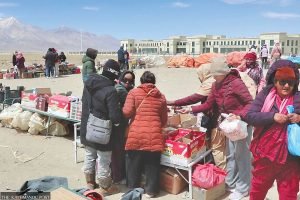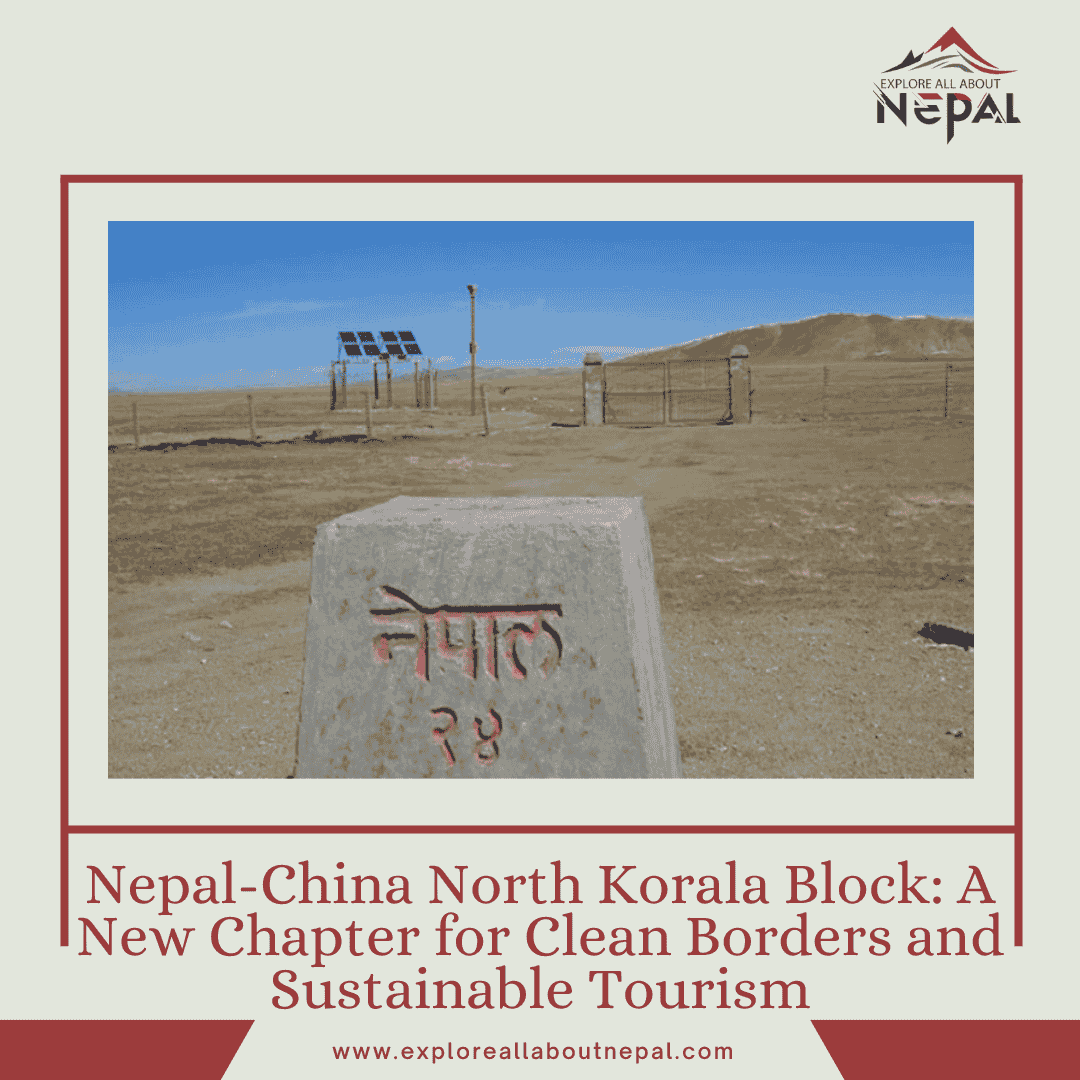Nepal-China North Korala Block, one of the prominent transit points connecting Nepal’s Mustang district to China’s Tibet Autonomous Region. This initiative marks a fresh commitment toward ecological responsibility, sustainable tourism, and strengthened diplomatic ties between the two nations.
This comprehensive cleanup drive not only boosts the region’s aesthetic and environmental value but also sends a powerful message about Nepal’s dedication to cleanliness and eco-tourism. In this blog, we will explore the background of the Korala border, the objectives of the cleaning initiative, involved stakeholders, and the future implications of this move.

About North Korala Border: A Strategic Gateway
The North Korala border, situated at an altitude of about 4,660 meters (15,289 feet) above sea level, is one of the northernmost border points between Nepal and China. Located in Lomanthang Rural Municipality of Mustang District, this block is not just a border checkpoint—it’s a historical trade route once used by salt traders from Tibet and Nepal.
It officially opened for bilateral trade and controlled movement in recent years and holds potential to become a major trade and tourism hub in the Himalayan region. However, with growing activity comes environmental concerns, especially waste accumulation due to unmanaged foot traffic, vehicles, and informal trade.
Why Cleaning the Korala Block Matters
Cleaning efforts in this region are about more than just waste collection. Here’s why it’s crucial:
Environmental Preservation: The fragile Himalayan ecosystem is extremely sensitive. Plastics, metal scraps, and other non-biodegradable waste can disrupt the natural balance.
Tourism Boost: Mustang is a popular tourist destination. A clean and well-maintained border area will enhance the visitor experience, especially for those traveling to Upper Mustang.
Trade Facilitation: A clean and orderly border helps in streamlining trade processes and improving the working environment for border officials and local traders.
Cultural Significance: The Korala region is rich in Tibetan Buddhist culture. Cleaning the region helps preserve religious sanctity and heritage sites.
Who Is Involved in Cleaning Drive of Nepal-China North Korala Block ?
The cleaning initiative is being led by a joint collaboration between Nepalese local authorities, security forces, NGOs, and local communities. The main contributors include:
Lomanthang Rural Municipality
Armed Police Force (APF)
Nepal Army and Nepal Police
Environmental NGOs and Volunteer Organizations
Local Youth Groups and Tourism Entrepreneurs
China has also shown positive diplomatic support, encouraging mutual efforts to keep the border region clean, especially amid plans to boost infrastructure and logistics on both sides.
Key Activities Carried Out During the Cleaning Campaign
The campaign began in early April 2025, focusing on a series of organized cleaning activities, such as:
Collection of plastic waste, metals, glass bottles, and discarded clothing.
Proper disposal and recycling of waste materials.
Awareness campaigns for traders, tourists, and transport operators about maintaining cleanliness.
Restoration and maintenance of infrastructure like public toilets, resting areas, and information boards.
Installation of waste bins and signage to promote long-term cleanliness.
Voices from the Ground
Local leaders and authorities have expressed strong enthusiasm for the campaign:
“This is just the beginning. The Korala border has historical, cultural, and trade significance. Keeping it clean is our shared responsibility.”
— Chairperson of Lomanthang Rural Municipality
Tourism operators also feel hopeful:
“A clean border is a welcoming sign for travelers. We hope this initiative brings in more responsible tourism and economic opportunities.”
— Local tour operator in Jomsom
Impact on Trade and Tourism
With the ongoing efforts to develop infrastructure near Korala, such as roads, customs offices, and market spaces, this cleaning drive will complement economic development in the region.
Trade Perspective: Mustang’s unique location makes it a gateway for Chinese imports and Nepali exports, including handicrafts, herbs, and traditional goods. A clean and functional border improves cross-border trust.
Tourism Impact: Mustang, especially Upper Mustang and Lomanthang, attracts adventure seekers, cultural explorers, and trekkers. A cleaner route means safer and more enjoyable trips, drawing both domestic and international tourists.
Challenges to Sustainability
While the cleaning campaign has made headlines, several challenges remain:
Maintaining regular cleanliness due to harsh weather and terrain.
Educating travelers and traders on responsible waste disposal.
Ensuring budget allocation for continued maintenance.
Monitoring cross-border waste movement, as trade increases.
These challenges call for ongoing monitoring, policy-level support, and active community participation.
What’s Next? Future Plans and Recommendations
To ensure that this cleaning effort has long-term impact, authorities and stakeholders must:
Set up permanent waste management units at the border checkpoint.
Deploy trained personnel for daily cleaning and maintenance.
Integrate cleanliness as part of border regulations and tourism permits.
Engage local schools, businesses, and tour guides in awareness campaigns.
Use digital platforms and social media to promote clean travel and environmental stewardship in Mustang.
Additionally, Nepal can use this opportunity to showcase its eco-conscious tourism model, boosting its reputation globally.
Highlights
The Nepal-China North Korala Block is gaining attention as a vital trade and tourism gateway in the Himalayan region.
A major cleaning campaign has officially begun at the Nepal-China North Korala Block, signaling a commitment to environmental preservation.
Situated in the Mustang district, the Nepal-China North Korala Block holds strategic importance for both countries.
Authorities are working together to ensure the Nepal-China North Korala Block remains clean and well-managed for future development.
The recent activities at the Nepal-China North Korala Block reflect growing cooperation between Nepal and China.
Sustainable tourism practices are being promoted around the Nepal-China North Korala Block to protect its fragile environment.
Traders and local entrepreneurs believe the Nepal-China North Korala Block will become a thriving business zone in the coming years.
Cleanliness at the Nepal-China North Korala Block is expected to improve the overall tourist experience in Mustang.
The elevation and historical relevance of the Nepal-China North Korala Block make it a unique destination for cultural tourism.
With growing attention, infrastructure development is underway at the Nepal-China North Korala Block to support trade and travel.
Environmental organizations have welcomed the cleanup of the Nepal-China North Korala Block as a model for other remote regions.
The Nepal-China North Korala Block not only serves as a border but also as a cultural bridge between the two nations.
Improved sanitation and waste management at the Nepal-China North Korala Block will enhance cross-border operations.
Youth groups and volunteers have actively participated in cleaning the Nepal-China North Korala Block, showing strong local commitment.
As Nepal continues to promote eco-tourism, efforts like cleaning the Nepal-China North Korala Block are essential to its success.
Conclusion
The initiation of the cleaning campaign at the Nepal-China North Korala Block is more than just a surface-level operation—it is a profound statement of Nepal’s intent to blend development, diplomacy, and environmental responsibility. As the world watches this border area evolve, Nepal has a chance to become a regional model for clean and sustainable tourism and trade.
Let’s hope this momentum continues and inspires similar efforts at other border points and remote tourist destinations across the Himalayas.


